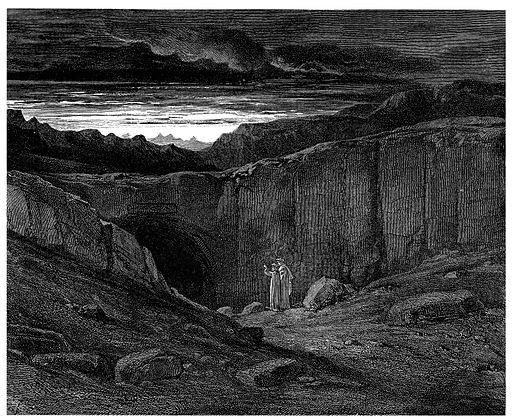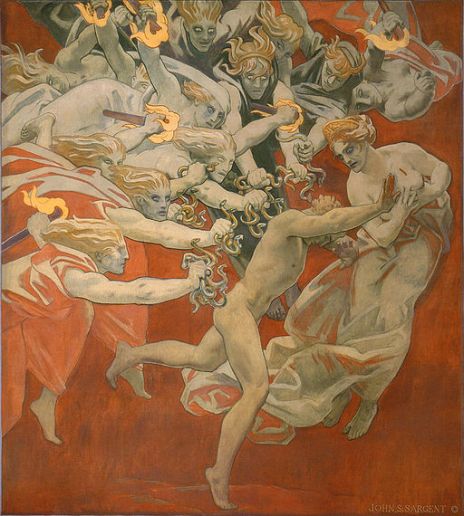…always a rage against the blind harmony of an anaesthetized life. Instead, a life amid the salient, the awkward, the pathologized; buffeted and discontent, at peace only in a rough sea.*
Is it possible that the very flight away from our experience of pathology misses the beauty of its necessity, removing us from artful expression of the most rooted, inherent place we find ourselves in, a place that by necessity calls for struggle? Instead of the fight against pathology, which demands that we heal, fix and remove the soul’s infirmities, rather, might we not seek a perspective that gives the passions their due, by listening for their mythological background that conjoin the most personal sense of ourselves with the eternal happenings of a world.
Perhaps we must first acknowledge things from a mythological perspective that conjoin to the eternal; seeing ourselves and others not only as products of family, culture, time and place, but also as characters expressing the struggles inherent in every age, time and place. Death then is the primary protagonist. That battle against which remains hopelessly futile, for it is life itself that brings death into being. Can we, like Dante did, “Abandon all hope, ye who enter here?”
Crazy talk maybe, especially in a frequently literalized, anesthetized world where the sensibility of ‘life as art’ is often exchanged for artifice, making believers rather than lovers out of us all. In this world, language itself is in danger of extinction, especially the beauty and danger of an untamed speech.

For I want to suggest that untamed speech of the widest reach and wildest pitch effects vengeance in itself. And further to suggest, that the docility of speech, the absence of vehemence and hyperbole, the balanced phrases of the nightly news, reporting the facts of worldly horror, force the Furies underground, ultimately, since the repressed returns, and directly causing yet more facts of worldly horror to be reported with that same calm mask and blank smile. Could it be that were our words wild enough, our worlds would be more inhabitable? Could Shakespearean hyperbole be a cultural remedy?*

I am suggesting that the patient’s disorder, that he and she cannot function in the civilization, is the civilization itself declaring dysfunctional bankruptcy. For what is the value of a civilization if its citizens are made ill by it? And what is the value of a therapy if it only abets the growth of civilization; in a civilization that measures its standing rank by gross domestic product (GDP)?*
As Hillman notes, shall we not also consider whether or not fixing our personal pathology means aligning oneself to the pathology of a civilization that is in the grip of its own inherently self-destructive end as it plays out the mythological battle of good vs. evil both within and between cultures? Although sometimes blamed on religious ideology, perhaps the root of apocalyptic endings lies within the heart of any culture that pathologically denies any place for its shadows, ever-believing that light can and should overcome them, striving always to beat them into submission by reforming their contents, rather than accepting the message of struggle that shadows reveal to us.
By shadows I mean not only all that cannot be seen, known and understood, but that which is forever out of human reach to change the nature of: death, both of the individual and the planet; along with all of the little deaths experienced every moment, every day; the loss of a loved one, a job, a home, a friend, a belief, our innocence, one’s health or youth. So much in life forever lies unobtainable: truly knowing another’s thought and heart, what the future may bring, security, a life without pain-whether one’s own or another’s, or what happens after death.
But neither fax nor even flesh can satisfy the fantastical appetite. We are impoverished psychologically when we are impoverished linguistically. The bridges are down because the moon is down, imagination beclouded by literal information. We have forgot Coleridge’s warning about “the danger of thinking without images” and so our minds, our very civilization, succumbs at one and the same time to both cynical nihilism and full-faithed fundamentalism.*
We know we have taken the bait anytime we find ourselves within a fantasy of good vs. evil that clamors for nothing less than a real-world outcome of a personal or collective idea of “how things should (or shouldn’t) be.” The more our ideals express purity and perfection, favoring the light over the dark, the darker our world seems, and so becomes.

This argument against bombast makes me refine my proposal. It’s not heightened speech as such but, rather, our relation with it. An inverse proportion between words and acts — the wilder the words the less wild the acts — holds only insofar as we enjoy the language for its own sake; the vehemence, the insult, the braggadocio become pleasurable acts, giving a delightful satisfaction.*

The archetypal imagination underlies and embraces all together; all the world’s a stage, and we in our seats are in the play, since its words are voicing our souls. How hard this is for us to conceive today, since, for us, all the people we know are people first, and then they speak, words issuing from them as secondary phenomena.*

Well, we all have a story, and individual situations, that belong only to us, designed for us personally to discover Heart, by the power of Spirit.
The only way we can reach a truly Human condition, its through of what the Sufis name “Tawba” translated as repentance, and the Hadith on the Hearts, that says:
“Verily, the hearts of the children of Adam, all of them, are between the two fingers of the Merciful as one heart. He directs them wherever he wills.” Then, the Prophet said, “O Allah, the director of the hearts, direct our hearts to your obedience.”
It’s said than when Allah decides to gift you with such a experience he turns your heart with his two fingers.
And that turns your attitude from heedlessness, to remembrance, and put you in the way to return to God obedience, and favors.
As the circumstances from life, are individually different, we all have our own story, and our own way to discover heart, I used to say to those who will care to listen me when in pain, by sorrow:
“Well, now you are in a great position, you have being offered a great gift, most of the time our heart needs to be broken, to discover we have a Heart”
Regarding to your own situation, it can apply to you as well, it all depends on our personal attitude to turn personal grief into Gold.
A true Alchemy of the Heart.
And talking about timely, or I would say synchronicity, just wrote the above to included on the post I was telling you about! 🙂
Earlier on my blog I wrote some posts where I wrote personal experiences connected to my past, and I guess can only be understood by me as an affair of the Heart.
On some other posts I connect events related to me, by the theme of the post itself, of the above here you can read it if you wish.
Blessings to you Debra. 🙂
LikeLiked by 1 person
It feels that God sends the message and the messenger when we need it most. I sense that now, both in our conversations and with my dear women friends and colleagues at work. Having said that, it’s most likely true that one’s heart must be made ready and perhaps it is the shattering through loss and a breakdown or failure to continue on in the same way that once seemed to work.
I think that my mother’s death rattled the deeper layers of my being and have given me an acute sensitivity to attend to each and every moment in a new way. It’s as if I am beginning to see people in ways that I have not been capable of before. The wounds can lock us up in fear and provide us with a script for how we react, rather than allowing an opening through the senses to fully feel, for better or worse. That takes a lot of trust and courage, I think. For now, I still feel as if who and how I am can only be half-baked. Maybe that is how we always are? …and to know and accept that state is part of recognizing just fluid we are? At this point my mind gives up, and gives in…thought can’t really take you past some ideas, no matter how good they sound 🙂 And yes, therefore, what seems to remain is a sense of repentance, or a reconsideration in each moment of what it is that I am feeling and responding to. William Stafford has a book of poems titled, You Must Revise Your Life, which stresses the idea that writing both creates and destroys at the same time, and that our practice with language isn’t linear, but a putting feelers out there that allow language to birth an idea in us. The birthing though necessarily has a correlation to destruction. When language goes beyond the attempt to “tell,” it reveals something beyond our knowing:
The Trouble with Reading
When a goat likes a book, the whole book is gone,
And the meaning has to go find an author again.
But when we read, its just print – deciphering,
Like frost on a window: we learn the meaning
But lose what the frost is, and all that the world
Pressed so desperately behind
So some time let’s discover how the ink
Feels, to be clutching all that eternity onto
Page after page. But maybe it is better not
To know; ignorance, that wide country,
Rewards you just to accept it. You plunge;
It holds you. And you have to become a rich darkness.
– William Stafford
It’s also not surprising that some sort of synchronicity has entered into our dialogue and sharing. I am grateful to you as I am to my women friends, all of which is happening now continues to deepen a sense I have of being more present to every moment and seeing anew.
I look forward to reading your posts…
LikeLike
Yes, we live in a dualistic reality, of opposites, and we cannot avoid it, and the reason we see or reality as a temporary abode, not a permanent, which of course death makes it clearer, and the advice of the Sages to keep it to a middle Way, and the reason language seems to always fail to address Truth.
And symbols, Imagination, and Metaphor, plus experience are superior to language.
The word “Equanimity” not enough used to understand Freedom, and Liberation, understood as a balance of the Soul, a state of psychological stability and composure which is undisturbed by experience of or exposure to emotions, pain, or other phenomena that may cause others to lose the balance of their mind. from Latin aequanimitas, from aequus ‘equal’ + animus ‘mind’ used by the Stoics, and other Greek philosophers at the day when Philosophy, was not just a tool for reasoning, and arguing, with little benefit to behavior, and composure, as it is today.
However, Verb itself has a great power, and speech as in the Abrahamic Religions as well in the Hindu, have a preponderant role and its usefulness, and Power as when God wants something he just have to say: Be!
And God proves the superiority of Men to the Angels by making Adam name all the creatures and things.
For us language remain an incomplete, and limited tool of communication, and understanding, as ambiguous, and subjective as its different for every individual to understand despite the definitions of a word, and its many meanings in the dictionary.
Curiously the Yaminahua Shamans, and many other tribe Shamans they use the ambiguity of words in a roundabout way, for their purpose, and never use language in their rituals, and ceremonies in a direct way:
Why do Yaminahua shamans talk in twisted language? According to one of them:
“With my koshuiti I want to see – singing, I carefully examine things – twisted language brings me close but not too close – with normal words I would crash into things – with twisted ones I circle around them – I can see them clearly. “
Thank you Debra, already read this post some years ago, and liked it, and find useful our conversations to throw light on many issues, and thank you for taking the trouble to write my your wonderful thoughts, I appreciate them. 🙂
LikeLiked by 1 person
Yes, these conversations are timely for me as I am navigating a big life change. Recently divorced from my second marriage, I am getting ready to leave my job and move to the east coast to be closer to my sister and father (turning 89 next month!).
The months that led up to this change have been emotionally tumultuous! I can’t say that I was able to navigate a storm-free route, by any means. I am just now experiencing some emotional calm that I was beginning to wonder if I would ever experience again.
So, your words of wisdom here,
“…a state of psychological stability and composure which is undisturbed by experience of or exposure to emotions, pain, or other phenomena that may cause others to lose the balance of their mind,”
…were lost to me this go around anyway. But, having gone through several of these intense periods of near madness in the past, as painful and unpleasant as they are, I do trust that a) they will pass, and b) that they want something from me.
In this current phase, what surfaced was a presence of my mother, who passed away in October. It was as if I was living through her past, going through emotional turmoil that I witnessed her go through after my parents divorced. At the time, I was in my early teens and was very much swept up in the current of her instability. What I am realizing now, is just how much I wanted to protect her, but couldn’t. Her vulnerability became my vulnerability, but I was not able to consciously acknowledge my own emotions at the time. I feel that she has returned to me from the dead to redeem us both. Do you have any thoughts on your ancestors, and the idea that they do seem to ask us, the living, to attend to the ancestral wounding if we can?
This resonates deeply with me:
“With my koshuiti I want to see – singing, I carefully examine things – twisted language brings me close but not too close – with normal words I would crash into things – with twisted ones I circle around them – I can see them clearly. “
Maybe this “circling around” provides us with just the perspective we need.
Likewise on our conversations here. They are invaluable to me, as if you showed up just when I most needed a friend to exchange thoughts and ideas with. Blessings!
LikeLiked by 1 person
Hi Debra,
I’m still on this first question: “Is it possible that the very fight away from our experience of pathology misses the beauty of its necessity, removing us from artful expression of the most rooted, inherent place we find ourselves in, a place that by necessity calls for struggle?”
Lots of Love,
Ka
LikeLiked by 1 person
Me too Ka, me too!
Thank you!
LikeLiked by 1 person
Hi Deb,
Thanks for helping bring into relief a distinction between personal and collective pathology. While psychology as a business thrives on their separation and would wish to keep them fused for its own purposes, we might all benefit from discriminating our own natures — if only we could accept them. I think this is an exceedingly difficult task (not that it’s ever been easy) for an increasingly subjective consciousness bound within the confines of an increasingly collectivized and ideologically-oriented culture. Keep pushing the limits — we need it! Hope you’re doing well — keep reminding me why we had those conversations on DPA!
LikeLike
‘The bridges are down because the moon is down’ : i do so love this line!
LikeLiked by 1 person
It’s a beautiful reminder that we seeing in the dark doesn’t always mean obliterating the dark.
Thanks for the leaving a note!
LikeLiked by 1 person
i actually didnt think about it in that way at all, but i can see this, too. its always nice to see you in my reader 🙂
LikeLiked by 1 person
Thank you Debra for such a timely and provocative post. I think that the Armageddon, annihilation theme speaks to the human condition, our bodies will fail to function and eventually disintegrate into dust. I once belonged to a group where the leader constantly prepared for “End Times”. Turns out he was corrupt and the endtimes were his own eventual demise.
Commercialism clashes with soulful language and communication. With another Mercury retrograde cycle upon us, it is very apropos to consider the wildness inherently ours.
Regarding the light and my blog message ( and philosophy). The shadow is out, no secret here and the planet is imploding all around us. We are energetically light and consciousness and my aim is to keep myself in check and shine a light for those seeking it within and without.
How wonderful to see you here, doing and saying your truth.
hugs, Linda
LikeLiked by 1 person
Hi Linda,
It’s sad, but perhaps inevitable that people use the power that fascinates them only to be felled by it. I suppose in a culture that is plugged in 24/7, as we are, power abounds now days inways unimaginable even 20 years ago! There are many though, who like yourself, are motivated by experiencing power firsthand, with a desire to help themselves, others and do good work.
I think of light as morally neutral, necessary and powerful. I think of dark the same way. It’s tricky to express the idea that it is in the dark where we find all that can be so hard to see, but also necessary. My perception of our culture is that light is frequently overvalued at the expense, or neglect of the dark. I’m speaking in very general terms here, but I’m guessing that you understand these distinctions anyway!
Thanks for being a very supportive friend and leaving a note!
Hugs,
Deb
LikeLiked by 2 people